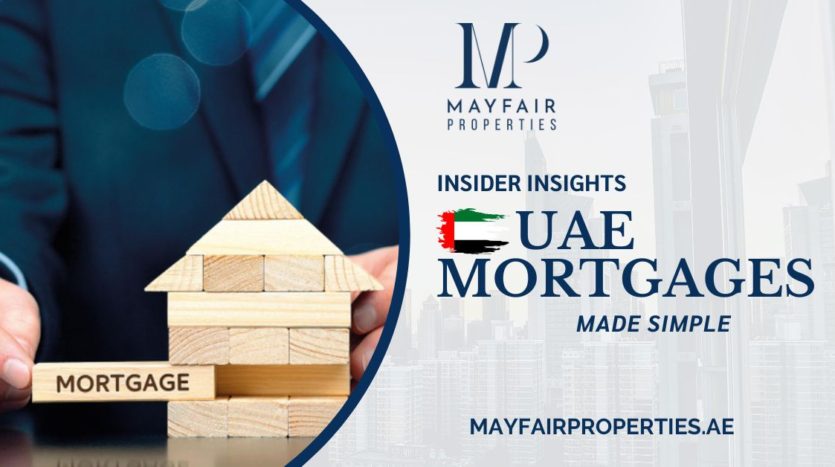Insider Insights: UAE Mortgages Made Simple
Are you considering purchasing property in Dubai? You’ve got two options: cash or mortgage. While cash may seem more cost-effective upfront, opting for a mortgage offers you greater financial flexibility.
If you’ve been scouring for information on ‘mortgage in Dubai‘, dive into our detailed post to learn how UAE Mortgages can help you secure a home loan effortlessly!

Mortgages in the United Arab Emirates
The United Arab Emirates (UAE) has grown in popularity among expats, particularly in business hubs like Dubai and Abu Dhabi. Reflecting this, the mortgage market in the UAE has matured, with both local and international lenders providing home loans to expatriates. Foreign nationals residing in the UAE can access both residential and buy-to-let mortgages, though eligibility requirements differ.
Considering Buying Property in the UAE?
Despite the millions of expats residing in the UAE, many still opt to rent rather than buy. This choice may stem from concerns over the expense of purchasing property, uncertainty about the duration of their stay abroad, or the intricacies involved in property transactions.
Foreign investors in the UAE have the opportunity to acquire apartments and houses in designated areas featuring freehold developments. Often, expatriates prefer purchasing new homes off plan properties directly from developers, typically entailing an initial 10% deposit and subsequent payments according to construction milestones.
However, it’s essential to note that project timelines aren’t always steadfast, and delays are not uncommon. Seeking legal guidance before embarking on this route is advisable.
The expenses associated with buying property in the UAE can accumulate swiftly. In Abu Dhabi, a transfer fee of 2% of the purchase price is payable to both the estate agent and the municipality. Additionally, on new properties, a fee of AED 5,000 is levied by the developer.
Who Qualifies for a Mortgage in the UAE?
Foreign individuals are eligible to obtain a mortgage in the United Arab Emirates, subject to specific criteria. Typically, applicants must have maintained their current employment for a minimum of six months to a year, depending on the locality and the lender’s policies.
For self-employed individuals, a track record of at least two years in business is typically required. Additionally, having an established banking relationship can work in your favor as the bank will be more acquainted with your financial circumstances.
Interestingly, some banks impose restrictions based on the applicant’s employer. Those working for government entities, banking institutions, or multinational corporations usually face no obstacles in mortgage applications.
However, individuals employed by smaller or less-established companies may encounter difficulties securing loans from certain lenders, even if their creditworthiness is sound.
Exploring Mortgage Options in the UAE
In the United Arab Emirates, mortgages come in two main types: fixed-rate and variable-rate. Fixed-rate mortgages typically span around five years, though some may extend to just one year. After the fixed term ends, the agreement transitions to the bank’s variable rate.
Opting for a fixed-rate mortgage offers you stability in repayment amounts for a predetermined period. However, if there’s a possibility of interest rates decreasing, a variable rate deal might be worth considering. Mortgage terms generally span 25 years, with repayment typically required before reaching the age of 70.
Navigating Mortgage Documents in the UAE
Securing a mortgage in the UAE entails gathering specific documents, which can vary depending on the bank you choose.
Typically, lenders will request:
- A copy of your passport
- Proof of UAE residence and current address
- Financial documentation like salary proof, bank statements, or tax returns
UAE Mortgages: A Step-by-Step Guide
Here’s a simplified breakdown of the mortgage application process:
- Decide whether to approach the bank directly or use a broker.
- Research to find the most suitable mortgage for your needs.
- Obtain an agreement in principle from the bank and request a supporting letter.
- Find a property within your budget and make an offer.
- Upon agreement on the price, pay the deposit to finalize the purchase and set a completion date.
- On the completion date, the mortgage lender disburses the funds to the seller.
Determining Your Borrowing Capacity for a UAE Mortgage
When considering a residential loan in the UAE, expatriates must be prepared to provide a deposit of at least 25% for properties valued up to AED 5 million. For higher-priced properties, the deposit requirement increases to a minimum of 35%.
For those interested in property investment and rental income, a buy-to-let mortgage is necessary, typically necessitating a substantially larger down payment ranging from 40% to 50%.
Borrowing limits are also enforced. The total amount borrowed, including interest, cannot exceed your projected earnings for the next seven years.
In Dubai, mortgage payments are capped at 50% of your monthly income, a notably lenient restriction compared to the 30% or 35% caps observed in some European countries
Bottom-Line
Understanding the intricacies of the UAE’s mortgage landscape is vital for prospective property owners. From fixed-rate to variable-rate options, and factors like deposit requirements and borrowing limits, comprehension of these nuances is key.
Expats and foreign investors must familiarize themselves with eligibility criteria, document requirements, and the application process. With diligent research and potential expert assistance, securing a mortgage can be the gateway to fulfilling your property ownership dreams in the United Arab Emirates.






